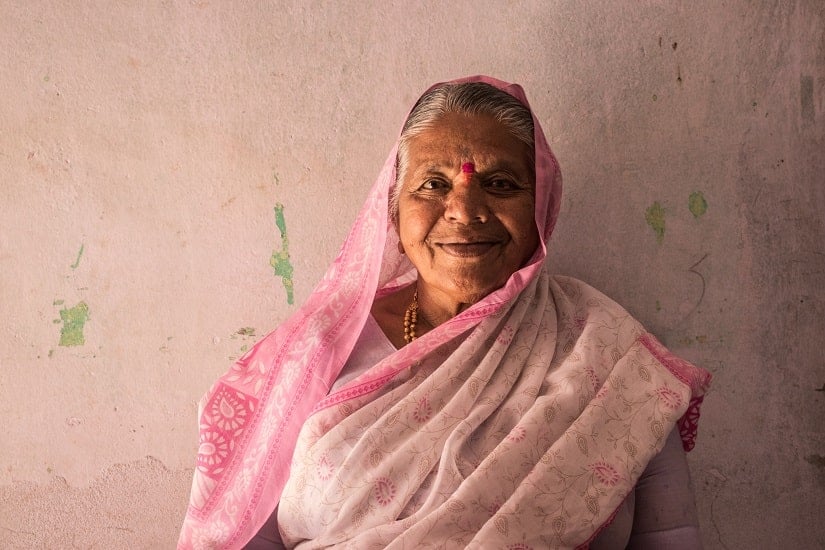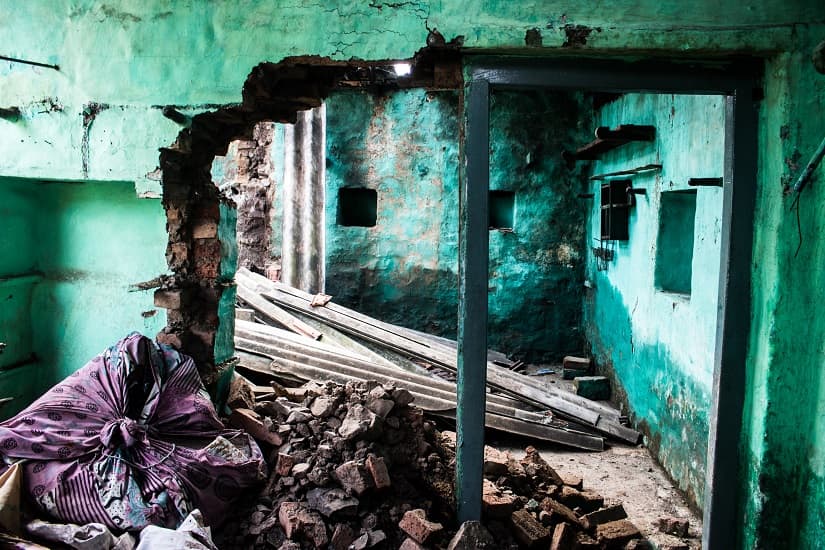This Government, doesn’t heed the law With all the laws ruled out, dumped into fire There’s no fuel even to keep the lamp burning Tall promises, and hollow actions That’s what they’re up to now This Government, has turned futile You make long speeches in every neighbourhood that you visit And now for the people, you have sold your own nation This Government, has turned futile — From verses by Akkatai Mohite; translated from the Marathi by Vishakha Ghadi *** Throughout her life, music has been Akkatai Mohite’s constant companion. For the four decades that the Kurundvad (in Kolhapur district’s Shirol taluka) resident worked in the fields, the other labourers would wait for Akkatai to begin singing one of her self-composed ditties. Only then would the work commence. Little did Akkatai know that her rousing songs would soon serve as a clarion call for social justice. [caption id=“attachment_7671431” align=“alignnone” width=“825”]
 Akkatai Mohite has been singing revolutionary songs for more than three decades now. All photos by Sanket Jain[/caption] Akkatai came from a family of musicians; some played the shehnai, others the harmonium, tabla etc. While her childhood was spent watching her father and uncles perform, Akkatai herself was dissuaded when she expressed an interest in music. “I had to look after the cattle, milk them… That’s what women were restricted to back then,” she says. But Akkatai found other ways of indulging her love for music, listening to and memorising songs from the radio. Akkatai was married at the age of 13; her husband worked at the powerlooms, and suffered from alcoholism. Later, Akkatai found work in the fields, earning 10 annas (16 annas made a rupee) to begin with, for eight hours of labour. When she finally ‘retired’ in 2017 due to her age (she was then 73), her daily wages amounted to Rs 200. *** In a life fraught with hardships, the turning point came when Akkatai lost her children and husband. She was in her late 40s at the time, and the question “What will I do with my life now?” seemed to have no answer. Sorrowful and alone, one day Akkatai set off for the nearby ghat, intending to end her life. Another villager — Popat Bidkar — saw her and figured out what she meant to do. He dissuaded her, pointing out that “suicide is not an answer”, and saw Akkatai home safely. For Akkatai, the struggle with her paralysing thoughts continued. “At that time, I thought I’ve lost everything. Nothing can get worse than this,” she says. Then, she met some revolutionaries from the neighbouring villages, who were fighting for the poor. “I came in touch with comrade
Narayan Gaikwad from Jambhali village,” Akkatai remembers. “Soon, I met more revolutionaries and started going to the protests.” Participating in these protests charged Akkatai; she felt moved to fight for others. She felt the injustice of their lives deeply, and in a return to what she knew (and loved) best, began using songs and poetry as a medium to address it. Inspiration came in the form of Lata Mangeshkar’s ‘Ae Mere Watan Ke Logon’, which left Akkatai awestruck when she heard it the first time: “I thought, how could a song be so powerful that it brings you to tears?” she says. Akkatai began experimenting with her own songs, composing verses that drew on her struggles. And by attending the protests, she developed a deeper understanding of societal problems, which in turn informed her compositions. *** When I ask her how many protests she has been to, Akkatai laughs. “Hishobach nahi (There’s no count of it),” she says. “I never sit at home. I’ve dedicated my life to the welfare of the poor.” Akkatai has never had to ask others to join her for the protests. Her songs are inspiration enough. People have told her they believe “this woman can fight for us and can help in getting our demands met”. Her music serves a more practical purpose as well: the protests can last up to several hours, and boredom could kill their momentum. Akkatai’s songs keep spirits from flagging. “Who will entertain them?” asks Akkatai, and laughs. “You have to keep fighting, till the demands are met. It’s not easy.” Each of Akkatai’s performances ends with her folding her hands into a ‘namaste’ to the crowd as she says: “Kai chukla tar maaf kara (Please forgive me, if I’ve said something wrong)”. Akkatai’s songs probably number up to 100, and address issues spanning poverty, floods, agrarian crises, the plight of agricultural labourers and women, elections, governance, politics, social welfare schemes, etc. She sings in Marathi, Kannada and Hindi. In 2004, Akkatai staged a non-violent protest in Kurundvad. “Three hundred people were denied the yellow ration card and we were fighting for that,” she recollects. Akkatai fasted for a week. Only after that did the officials issue the people a Below Poverty Line ration card. Akkatai has travelled to Delhi, Mumbai, Kolhapur, Nagpur and several villages of Kolhapur district as part of various protests. When she meets protestors — women farmers — from other states, they tell her: “Didi bade gaane bolo aur. Darne ki baat nahi hai (Sister, sing more revolutionary songs. You don’t have to fear)”. “It’s encouraging, and shows how much people love my songs,” Akkatai says, proudly. *** It takes Akkatai about two days to compose a song. Even though she dropped out of school, the lack of formal education has never been a hindrance. “I don’t know how to read and write, so I compensate for it by singing and composing songs in my head,” she says. Unfortunately, no one has written down her songs, so only oral renditions exist. She now wants her grandchildren to start documenting her compositions. “Right now, all the songs are in my head,” she says. Akkatai considers Savitribai Phule and Babasaheb Ambedkar as her inspirations. “After I am gone, I want people to remember my name and the work I did,” she says. She reveres Bismillah Khan and Lata Mangeshkar as her music idols. She recently heard of internet sensation
Ranu Mondal , and “how she got to perform at such a big level”. “Her voice is good,” Akkatai says. *** The August 2019 floods that swept through parts of Maharashtra were devastating for Akkatai. The floodwater took away Akkatai’s inspiration: her old radio. “Our house collapsed in the flood. I think the radio might be under the debris, but we haven’t been able to find it for three months,” she says, teary-eyed. [caption id=“attachment_7671441” align=“alignnone” width=“825”]
 Akkatai’s house was ravaged by the August 2019 flood for which she hasn’t received any compensation yet. Her beloved old radio is lost somewhere under the debris.[/caption]
From our ’everyday heroes of rural Maharashtra’ series — meet 75-year-old Akkatai Mohite, whose revolutionary songs articulate the concerns of the marginalised
Advertisement
End of Article


)
)
)
)
)
)
)
)
)



